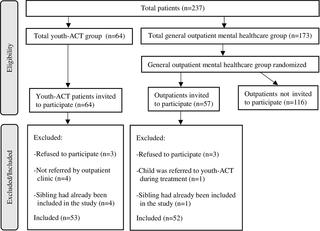Our official English website, www.x-mol.net, welcomes your feedback! (Note: you will need to create a separate account there.)
Unmet care needs of children with ADHD.
PLOS ONE ( IF 3.7 ) Pub Date : 2020-01-17 , DOI: 10.1371/journal.pone.0228049 Richard Vijverberg 1, 2, 3 , Robert Ferdinand 1 , Aartjan Beekman 3 , Berno van Meijel 2, 3, 4
PLOS ONE ( IF 3.7 ) Pub Date : 2020-01-17 , DOI: 10.1371/journal.pone.0228049 Richard Vijverberg 1, 2, 3 , Robert Ferdinand 1 , Aartjan Beekman 3 , Berno van Meijel 2, 3, 4
Affiliation

|
BACKGROUND
Non-compliance to, or drop-out from treatment for childhood ADHD, result in suboptimal outcome. Non-compliance and drop-out may be due to mismatches between patients' care needs and treatments provided. This study investigated unmet care needs in ADHD patients. Unmet needs were assessed in two different treatment settings (general outpatient setting versus youth-ACT). Youth-ACT treatment is an intensive outreach-oriented treatment for patients with severe psychiatric and psychosocial problems. Comparison of a general outpatient sample with a youth-ACT sample enabled us to assess the influence of severity of psychiatric and psychosocial problems on perceived care needs.
METHODS
Self-reported unmet care needs were assessed among 105 ADHD patients between 6 and 17 years of age in a general outpatient (n = 52) and a youth-ACT setting (n = 53).
RESULTS
ADHD patients most frequently reported unmet needs regarding mental health problems, information on diagnosis/treatment, and future prospects. Outpatients differed from youth-ACT patients with respect to 30% of the unmet care needs that were investigated. Outpatients perceived more unmet needs regarding information on diagnosis/treatment (p = 0.014). Youth-ACT patients perceived more unmet needs concerning medication side effects (p = 0.038), quality and/or quantity of food (p = 0.016), self-care abilities (p = 0.016), regular/suitable school or other daytime activities (p = 0.013), making and/or keeping friends (p = 0.049), and future prospects (p = 0.045).
CONCLUSIONS
Focusing treatment of ADHD patients on unmet needs may reduce non-compliance and drop-out. In clinical practice, systematic assessment of unmet care needs in all ADHD patients may be warranted, e.g. using the CANSAS questionnaire during the screening/intake phase.
中文翻译:

多动症儿童未得到满足的护理需求。
背景技术对儿童多动症的不依从治疗或退出治疗导致次优的结果。不合规和辍学可能是由于患者的护理需求和所提供的治疗方法不匹配造成的。这项研究调查了多动症患者未满足的护理需求。在两种不同的治疗环境中评估未满足的需求(一般门诊环境与青年ACT)。Youth-ACT治疗是针对重度精神病和社会心理问题患者的强化外展治疗。将普通患者的门诊样本与青少年ACT样本进行比较,使我们能够评估精神病和社会心理问题的严重程度对感知医疗需求的影响。方法对普通门诊患者(n = 52)和青年ACT患者(n = 53)中105名6至17岁的ADHD患者自我报告的未满足的护理需求进行了评估。结果多动症患者最常报告有关心理健康问题,诊断/治疗信息和未来前景的需求未得到满足。在所调查的未满足护理需求的30%方面,门诊患者与青年ACT患者不同。门诊患者对诊断/治疗信息的需求未得到满足(p = 0.014)。青少年-ACT患者认为在药物副作用(p = 0.038),食物的质量和/或数量(p = 0.016),自我护理能力(p = 0.016),定期/适合的学校或其他白天活动( p = 0.013),结识和/或保留朋友(p = 0.049)以及未来的前景(p = 0.045)。结论将注意力缺陷多动症患者的治疗重点放在未满足的需求上可以减少不依从和辍学的情况。在临床实践中,可能有必要对所有ADHD患者的未满足护理需求进行系统评估,例如在筛查/摄入阶段使用CANSAS调查表。
更新日期:2020-01-21
中文翻译:

多动症儿童未得到满足的护理需求。
背景技术对儿童多动症的不依从治疗或退出治疗导致次优的结果。不合规和辍学可能是由于患者的护理需求和所提供的治疗方法不匹配造成的。这项研究调查了多动症患者未满足的护理需求。在两种不同的治疗环境中评估未满足的需求(一般门诊环境与青年ACT)。Youth-ACT治疗是针对重度精神病和社会心理问题患者的强化外展治疗。将普通患者的门诊样本与青少年ACT样本进行比较,使我们能够评估精神病和社会心理问题的严重程度对感知医疗需求的影响。方法对普通门诊患者(n = 52)和青年ACT患者(n = 53)中105名6至17岁的ADHD患者自我报告的未满足的护理需求进行了评估。结果多动症患者最常报告有关心理健康问题,诊断/治疗信息和未来前景的需求未得到满足。在所调查的未满足护理需求的30%方面,门诊患者与青年ACT患者不同。门诊患者对诊断/治疗信息的需求未得到满足(p = 0.014)。青少年-ACT患者认为在药物副作用(p = 0.038),食物的质量和/或数量(p = 0.016),自我护理能力(p = 0.016),定期/适合的学校或其他白天活动( p = 0.013),结识和/或保留朋友(p = 0.049)以及未来的前景(p = 0.045)。结论将注意力缺陷多动症患者的治疗重点放在未满足的需求上可以减少不依从和辍学的情况。在临床实践中,可能有必要对所有ADHD患者的未满足护理需求进行系统评估,例如在筛查/摄入阶段使用CANSAS调查表。


























 京公网安备 11010802027423号
京公网安备 11010802027423号